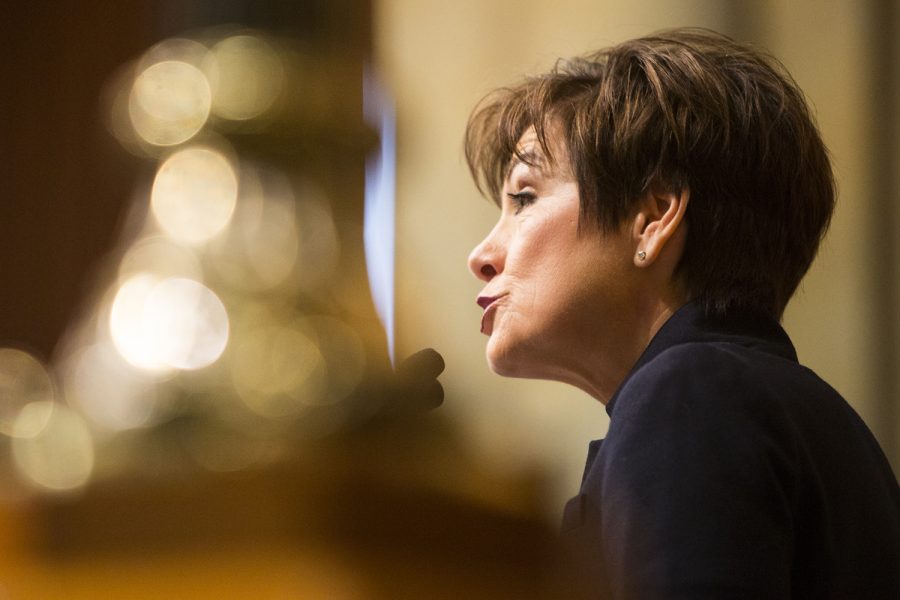Newby: Children’s mental-health bill exactly what future generations need
Children’s mental-health bill will encourage future generations to offer children more successful and opportunity-driven lives.
Iowa Gov. Kim Reynolds speaks during her first Condition of the State address in the Iowa State Capitol in Des Moines on Tuesday, Jan. 9, 2018.
April 23, 2019
There has been a great deal of conversation around the subject of mental health since Gov. Kim Reynolds was sworn into office. And more recently, the focus on children’s mental health paves a way for students grappling with behavioral disorders to have a successful and helpful foundation.
Consideration of the most appropriate ways to push for change in how communities grapple with mental-health issues expands across both past and current legislation in Iowa, offering services that span generations with accessible care.
House File 2456 extends mental-health services while adding six regional “access centers” that are committed to helping people caught in mental-health crises, yet don’t necessarily need hospitalization, the bill Reynolds signed into law in 2018.
Senate File 2113, also signed in 2018, requires staff and faculty of K-12 schools to have training in suicide prevention and toxic-stress intervention.
And House File 690, which lawmakers approved this session and awaits the governor’s signature, offers mental-health and behavioral-health services to children who demonstrate a need for them through “severe emotional distress.”
The number of children these services will equip and encourage is imperative for future generations, and combating mental health at an early age will shape the way those issues are met, talked about, and worked through from a community standpoint.
RELATED: Newby: The increase in K-12 public school funding is exactly what Iowa needs
According to Centers for Disease Control & Prevention, nearly 10 percent of children ages 2-17 years have received an Attention Deficit Hyperactivity Disorder diagnosis — slightly more than 6 million children across the country.
More than 7 percent of children ages 3-17 years have diagnosed behavior problems. And around 4 million children have been diagnosed with anxiety, while almost 2 million have been diagnosed with depression.
Confronting mental health at an early age is important because it carries enough weight and influence to shape the trajectory of an entire life.
According to the American Psychological Association, mental health and how childen are doing, both physically and emotionally, are essential in how people navigate their studies, how they develop, grow, and relate in interactive relationships, and how they succeed in the workplace later on.
For the estimated 15 million children who can currently be diagnosed with some sort of mental health-disorder, this kind of action to confront the issues is helpful in a multi-level way.
Offering services to children and their families that will allow them the appropriate tools and resources necessary to equip and empower the population of children grappling with ADHD, depression, anxiety, and more will build them up by offering preventative measures through education.
RELATED: McComas: Candidates need to focus more on mental health
The number of children receiving treatment for behavior disorders is only 53.5 percent — roughly 5-in-10.
And for the other half of children who are not receiving behavioral-treatment services, the disorders they face will continue to have the power and gravity to hinder their lives.
Navigating relationships will be a challenge for children with untreated behavior disorders. Their studies in school will have a level of difficulty they will struggle to meet, and pursuing future job opportunities will be limited based on the opportunities they were given — and able to — pursue throughout their education.
And so, House File 690 offers services and routes of success for the millions of children grappling with their mental health across the country. It offers windows of hope and opportunity to the families that are influenced — and is a much-needed resolution being met by a well-supported bill.






